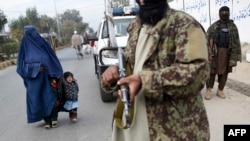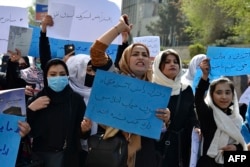The Taliban announced Saturday that an all-covering head-to-toe burqa will be mandatory in public for women in Afghanistan, the latest in a set of curbs the Islamist group has imposed on women’s rights in nine months since returning to power.
The reclusive Taliban chief Hibatullah Akhundzada issued the decree requiring all Afghan women to strictly comply with it, said the Ministry for the Propagation of Virtue and the Prevention of Vice, while sharing details at a news conference in Kabul.
The ministry said in a statement that a woman’s male “guardian,” such as her father, brother or husband, would receive a warning before being imprisoned for three days if the woman did not cover her face outside the home. It said the guardian would eventually be taken to a court for a stricter punishment if the decree is still violated.
The ministry stated that female government employees would be dismissed from jobs if they don’t cover their faces, and male employees would face suspensions from jobs if female members of their families are found guilty of breaching the edict.
The statement described a burqa as the best type of hijab, insisting it is “part of Afghan culture and it has been used for ages.” It added that another preferred type of women’s hijab is a long black veil and dress that should not be "thin or tight."
Most women in deeply conservative Afghanistan wear a headscarf for religious and cultural reasons, but many in urban areas, such as Kabul, do not cover their faces.
Critics denounced the Taliban for making a burqa mandatory and continuously infringing upon the freedoms of 50% of the country’s estimated 40 million people, warning it would further alienate the international community as well as donors.
The United Nations Assistance Mission in Afghanistan said it was deeply concerned with Saturday’s decision by the Taliban.
“This decision contradicts numerous assurances regarding respect for and protection of all Afghans’ human rights, including those of women and girls, that had been provided to the international community by Taliban representatives during discussions and negotiations over the past decade,” the UNAMA said.
The mission, the statement said, will immediately request meetings with Taliban de facto authorities to seek clarification on the status of the decision.
“The decision six weeks ago to postpone secondary schooling for Afghan girls was widely condemned internationally, regionally, and locally. Today’s decision by the Taliban might further strain engagement with the international community,” UNAMA warned.
Rina Amiri, the U.S. special envoy for Afghan women and girls, criticized the Taliban, saying they continue to adopt policies oppressing women and girls as a substitute for addressing the economic crisis and need for inclusive governance in the country.
“I join calls by Afghans & the int community to end these oppressive measures, reopen girls’ schools, let women work & resume their lives,” Amiri said on Twitter in response to the decision that Afghan women must wear burqas.
The Taliban defend their restrictions on women, saying they are in line with Sharia and Afghan culture. The group has already banned women from undertaking long road trips without a close male relative and ordered taxi drivers to refuse to accept female passengers not wearing an Islamic hijab. Men and women are also banned from visiting parks at same time.
The international community, joined by Islamic nations and Muslim scholars, have been pressing the Taliban to end restrictions on women to uphold their repeated pledges that they would respect human rights of all Afghans.
Heather Barr at Human Rights Watch alleged the Taliban’s apparent goal is “to erase women and girls entirely from public life” and make them “wards and property of their male relatives, with no autonomy.”
Torek Farhadi, a political commentator and former Afghan official, said Islam does not require women to be in a burqa.
“This is what the Taliban have asked for. They are the same people who have closed teenage girls’ schools as well. They just want to relegate women at home. A shortsighted view of their world,” lamented Farhadi.
Borge Brende, the president of the World Economic Forum, lamented in a statement that the Taliban’s burqa restriction comes on top of banning women from many government jobs and girls from secondary education.
“It is hard to comprehend but the Taliban today imposed one of the harshest restrictions on Afghanistan's women since seizing power, ordering them to wear the all-covering burqa in public,” Brende wrote on Twitter.
The radical group had previously ruled Afghanistan from 1996 to 2001, when women were barred from receiving an education and leaving home without being accompanied by a close male relative, leading to Afghanistan’s global isolation at the time.
Foreign governments have not yet recognized the interim Taliban leadership and linked any such consideration or opening diplomatic ties with Kabul to respect of human rights, particularly those of Afghan women.
In nine months since they retook Afghanistan on August 15, the Taliban have allowed female university students to return to classes in a newly-introduced, strictly gender-segregated education system. But they have not yet reopened high schools to girls.
The school ban was due to be lifted in late March but the Islamist rulers reversed the decision at the last minute, drawing strong condemnation from domestic critics and foreign governments. It prompted the United States to cancel planned meetings with the Taliban on easing the conflict-torn country’s financial crisis.
Washington and other Western donors cut development aid and enforced sanctions on the Afghan banking system immediately after the Islamist group seized power and the last U.S.-led foreign troops withdrew from Afghanistan on August 30 after nearly 20 years of war with the country's insurgents-turned-rulers.





